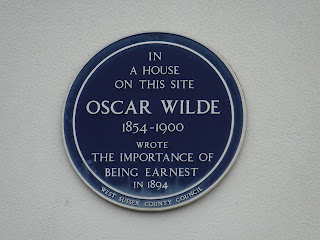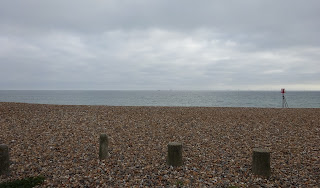I was walking along Cromer seafront recently and tripped over Oscar Wilde. Literally.
Inlaid into one of many stone hoops looping across the surface of the promenade like a time-travel special effect from 1960s TV, in gold lettering that shone even on a murky winter's day, the great wit declared:
"I find Cromer excellent for writing, golf better still."
Hmm. Not his most thrilling bon mot, but the experience did remind me of an excursion to another British coastal town a few years ago in search of the site of one of his better known creations.
"Worthing is a place in Sussex. It is a seaside resort."
'The Importance of Being Earnest: A Trivial Comedy for Serious People' was written in Worthing and is considered to be the Wilde's masterpiece. Playing with the writer's favourite themes of Victorian societal expectation, duplicity and paradox and featuring his trademark wit, wordplay and one liners, it's no surprise that audiences still love the work into the modern day.
It's the story of best friends Jack Worthing and Algernon Moncrieff, who live double-lives in an attempt to create a sort of upper-class, late 19th century work-life balance. Worthing is the upright and responsible Jack at his country estate, but becomes his fictitious, fun-loving younger brother Earnest in town. Moncrieff has invented an invalid friend, Bunbury, whose regular illnesses give Algernon the excuse to skip unappealing social engagements and escape to the city whenever he chooses. Jack is in love with Moncrieff's cousin Gwendolen, while Moncrieff hopes to woo Jack's ward, Cecily. Throw in the austere aunt Lady Bracknell, the dotty but well-meaning governess Miss Prism, coincidence and farce, and the play's a hit. Indeed, it has been a favourite of mine since childhood thanks to the superlative 1952 film version.
We Do Like to Write Beside the Seaside
'The Importance of Being Earnest' was written during a summer holiday to Worthing in 1894. In just 21 days, Wilde wrote the work for which he is best remembered. Knowing that there was a Blue Plaque dedicated to this remarkable bout of creativity, I decided to try to find it during a visit to the town one rather mild October a few years ago. After a trip to the gorgeous old cinema (The Dome is amazing!), lunch in an arcade café, promenade on the pier, and obligatory bookshop visit, it was time to go plaque hunting.
5 The Haven, Esplanade
I was hoping for "an undistinguished Victorian row house overlooking the beach" as described by Wilde biographer Barbara Belford (2001:235), but although Worthing still had many features Wilde would have recognised, the seafront around where he had stayed was a very different story. Having negotiated round an outcrop of building work coyly concealed by large white boards decorated with laughable artists impressions of expensive-looking executive flats, I came to a much later and slightly more run-down area that looked a long way from the site I'd expected. The building where Oscar Wilde had stayed had been demolished.
Eye Spy...
Under the watchful eye of a curious crow that had settled on the pebbled beach, I began looking for the promised blue plaque. It was too much of a test for my eyesight, but fortunately Prince Charming spotted it just as I was about to give up and accept that the day would end in disappointment. High up on a white-painted wall, there it was.
The Beginning of the End
As Wilde scholars know, 'The Importance of Being Earnest' was a watershed moment. Just as he reached the peak of his fame, Wilde's own double-life began to catch up with him. Enmeshed in a relationship with Lord Alfred 'Bosie' Douglas since the early 1890s, Douglas' father, the Marquis of Queensbury, had become increasingly furious about the association, publicly abusing and threatening the couple with physical violence. The conflict culminated in the notorious 1895 libel and then gross indecency trials, Wilde's two-year imprisonment in Reading Gaol, and ultimately his exile and death.
Tide & Time
Slightly disappointed by the view inland, I looked out to sea, wondering how much the coastline had also changed in the past 130 years. Cargo ships heavy with containers glided by, as stately as Lady Bracknell, while rows of off-shore wind turbines churned in the autumn air, like an uncoordinated chorus line. The screech of seagulls was accompanied by the hiss and gasp of pebbles moving reluctantly on the tide.
Somewhere south of Sussex, Oscar Wilde is buried. After serving his sentence, Wilde left for Europe, dying in exile in 1900. He was laid to rest in Paris' Père Lachaise Cemetery, in the country visible from this coastline on clearer days.
Wilde continues to be both a popular and controversial figure. Historians are still trying to separate the man from the myth, tackling the nigh impossible task of finding the facts of a secret second life that was supposed to stay hidden, a life that would have been very different had he been born a century later.
Worthing & Cromer
I really liked both Worthing and Cromer. They are alive and characterful, proud of their heritage, but also looking to the future. A lot of thought has clearly gone into how to appeal to the modern visitor and tell the story of the place its people, be they dandy writers, heroic lifeboatmen, or hardworking fisher-folk. One day, I hope to go back and see what other tales these places have to tell.




